Frontier Taiwan MODERN CHINESE LITERATURE FROM TAIWAN Modern Chinese Literature from Taiwan EDITORIAL BOARD Pang-yuan Chi Gran Malmqvist David Der-wei Wang, Coordinator Wang Chen-ho, Rose, Rose, I Love You Cheng Ching-wen, Three-Legged Horse Chu Tien-wen, Notes of a Desolate Man Hsiao Li-hung, A Thousand Moons on a Thousand Rivers Chang Ta-chun, Wild Kids: Two Novels About Growing Up Frontier Taiwan AN ANTHOLOGY OF MODERN CHINESE POETRY Edited by Michelle Yeh and N.G.D. Malmqvist  COLUMBIA UNIVERSITY PRESS NEW YORK Columbia University Press wishes to express its appreciation for assistance given by the Chiang Ching-kuo Foundation for International Scholarly Exchange in the preparation of the translation and in the publication of this series. Columbia University Press wishes to express its appreciation for assistance given by the Pushkin Fund toward the cost of publishing this book. Columbia University Press Publishers Since 1893 New York Chichester, West Sussex cup.columbia.edu Copyright 2001 Columbia University Press All rights reserved E-ISBN 978-0-231-51841-3 Library of Congress Cataloging-in-Publication Data Frontier Taiwan : an anthology of modern Chinese poetry / edited by Michelle Yeh and N.G.D. Malmqvist. cm.(Modern Chinese literature from Taiwan) Includes bibliographical references. cm.(Modern Chinese literature from Taiwan) Includes bibliographical references.
COLUMBIA UNIVERSITY PRESS NEW YORK Columbia University Press wishes to express its appreciation for assistance given by the Chiang Ching-kuo Foundation for International Scholarly Exchange in the preparation of the translation and in the publication of this series. Columbia University Press wishes to express its appreciation for assistance given by the Pushkin Fund toward the cost of publishing this book. Columbia University Press Publishers Since 1893 New York Chichester, West Sussex cup.columbia.edu Copyright 2001 Columbia University Press All rights reserved E-ISBN 978-0-231-51841-3 Library of Congress Cataloging-in-Publication Data Frontier Taiwan : an anthology of modern Chinese poetry / edited by Michelle Yeh and N.G.D. Malmqvist. cm.(Modern Chinese literature from Taiwan) Includes bibliographical references. cm.(Modern Chinese literature from Taiwan) Includes bibliographical references.
ISBN 0231118465ISBN 0231118473 (pbk.) 1. Chinese poetryTaiwanTranslations into English. 2. Chinese poetry20th century. I. II. II.
Yeh, Michelle Mi-Hsi. III. Malmqvist, N. G. D. Series. Series.
PL2658.E3 F74 2001 895.115080951249dc21 00024121 A Columbia University Press E-book. CUP would be pleased to hear about your reading experience with this e-book at . CONTENTS ) ) / ) / / ) / ) / / / / / ) / ) / ) / / ) ) / (18) ) / ) ) / / / / / ) / / / / / ) / ) / ) / / / / ) / ) / / / / ) / ) / / / / / / ) / ) / / / / ) / / ) ) / ) / / ) / ) / / / (14) / / / ) / / ) / / ) / ) ) / ) ) / ) / ) / ) ) / ) / ) / / / ) / / / ) / / / / / / ) / ) / / ) / / ) / / / / / / / / / ) / ) / / / ) / ) / / / ) ) ) / ) / / ) / / On behalf of the editors I wish to express our deep gratitude to the Chiang Ching-kuo Foundation for International Scholarly Exchange, which has been the sole promoter of the Modern Chinese Literature from Taiwan series in which this anthology is included. The compilation and editing of an anthology is a delicate task involving the selection of the poets to be represented; the choice of poems to be included in the work; the engaging of competent translators; and the editing of the submitted translations. The three members of the editorial boardMichelle Yeh, Xiang Yang, and myselfhave been solely responsible for the selection of poets. The poets themselves were asked to suggest which of their poems they wished to see included.
The translators were also invited to submit their preferences. The final decisions were made by the editorial board of the anthology. The editing of the translations has been undertaken by Michelle Yeh and myself, in close consultation with the translators. The introduction, biographical notes, notes to the poems, and bibliography were written and compiled by Michelle Yeh, Chief Editor. The editors gratefully acknowledge the enthusiasm and the fine spirit of cooperation with which the translators have tackled their often very difficult tasks. We also express deep appreciation of the efficient way in which Ms.
Jennifer Crewe, Publisher for the Humanities and Editorial Director of Columbia University Press, has guided the production of this anthology. The editors find it highly gratifying that two Chinese editions of this book will be published, one in Taiwan in traditional characters and the other, in simplified characters, in the Peoples Republic of China. The latter contains a preface by Mr. Liu Shahe, poet and literary critic, who has done much to introduce Taiwanese poetry to mainland readers. It is indeed high time that Taiwanese literature was recognized and better known in the Western world. N.G.D. N.G.D.
Malmqvist A project of this scope and duration would not have been possible without the contributions and support of many people. First of all, I thank all the poets for allowing us to include their wonderful poems in this volume and all the translators, with whom I have enjoyed working throughout. I am equally grateful to Xiang Yang, who has been invaluable in the planning and coordination of the project and in providing much-needed material for the introduction. To Jennifer Crewe, Editorial Director at Columbia University Press, and David Der-wei Wang, esteemed scholar and dear friend, I express my deepest appreciation for their enthusiastic support of the literature of Taiwan in general, and of this anthology in particular. Leslie Kriesel has done a fabulous job editing the volume; Ellen Yang, my assistant, has been most patient and conscientious; Chu Ko graciously provided the painting for the cover; John Balcom and Sophie Volpp read the first draft of the introduction and offered insightful comments. I thank them all.
Thanks also go to the Taipei Economic and Cultural Office in San Francisco and the Information Office in Taiwan for providing the map of Taiwan from The Republic of China Yearbook of 1999. Steve Bradburys translations of Xia Yus The Ripest Rankest Juiciest Summer Ever and Written for Others previously appeared in Fine Madness and Poetry International. Grateful acknowledgment is made to these journals for permission to reprint. Last but not least, I thank Gran Malmqvist, who invited me to participate in this project in the summer of 1997. It has been a most memorable experience working together, as I have learned so much. Like poetry itself, a friendship formed in poetry never ceases to inspire and to enrich.
Michelle Yeh We use the Pinyin romanization system throughout the anthology, except for a few names in view of previous, more familiar usage. For each poet, the first time the name is introduced in the biographical note, we include the Wade-Giles romanization in parentheses so that readers will recognize it in other publications where the older system is used. Italicized words in the title or text of a poem are in English or French in the original. The date at the end of each poem refers to the year of composition or, when so indicated, the date of first publication. Michelle Yeh MICHELLE YEH PROLOGUE An island is a paradox; it is simultaneously isolated and open, restricted and free, with the surrounding sea serving sometimes as a protective barrier, other times as a vital passage to other lands and cultures. Situated off the southeast coast of the Asian continent, with Japan and Korea to the north and the Philippines to the south, halfway between Shanghai and Hong Kong, Taiwan not only occupies an important strategic position in the western Pacific region but also is a nexus of diverse linguistic, economic, social, and cultural crosscurrents from Asia and other parts of the world.
Over centuries of clashing and converging, these influences have shaped and continue to shape the society on the island. If its small sizeonly 13,885 square miles, half the size of Ireland but comparable to Switzerland or Hollandhas historically been a cause of Taiwans marginalization, this is compensated for by an openness and an ability to adapt to the new. During the past four centuries, Taiwan has evolved dramatically from a little-known island to an entrept, an outpost of the Chinese empire, a Japanese colony, and, today, a nation-state with 23 million people and one of the largest economies in the world. Taiwan not only has come to embody an internationally acclaimed economic miracle but also is rightly proud to be a hard-won, mature democracy. DEFINITION OF MODERN CHINESE POETRY Equally deserving of worldwide recognition is that some of the best modern Chinese poetry also comes from Taiwan. The history of modern Taiwanese poetry tells the story of how the periphery has transformed itself into the frontier.
Next page
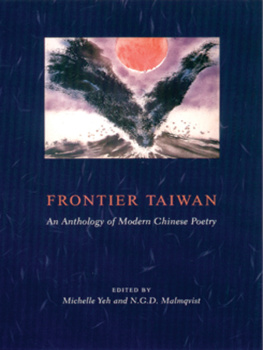
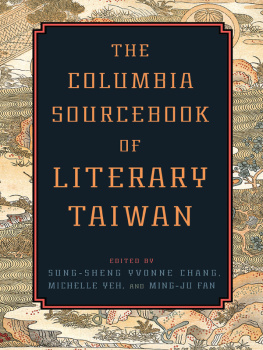

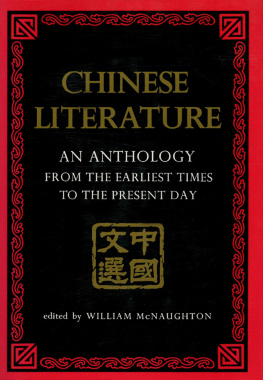
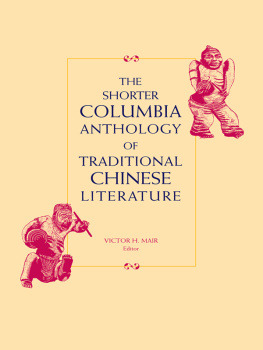
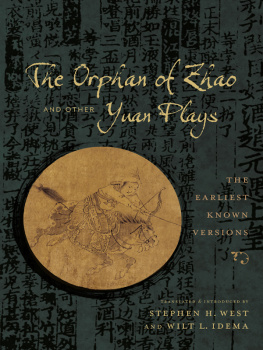

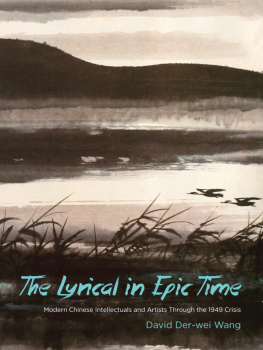
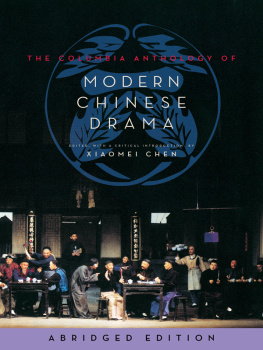
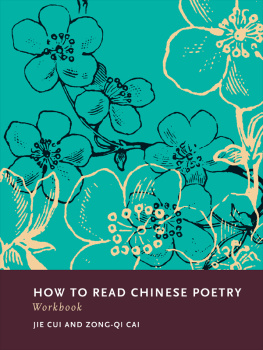
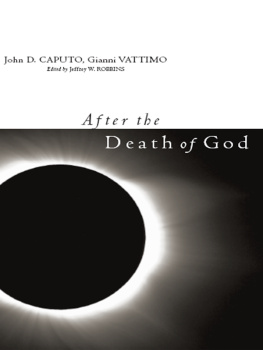
 COLUMBIA UNIVERSITY PRESS NEW YORK Columbia University Press wishes to express its appreciation for assistance given by the Chiang Ching-kuo Foundation for International Scholarly Exchange in the preparation of the translation and in the publication of this series. Columbia University Press wishes to express its appreciation for assistance given by the Pushkin Fund toward the cost of publishing this book. Columbia University Press Publishers Since 1893 New York Chichester, West Sussex cup.columbia.edu Copyright 2001 Columbia University Press All rights reserved E-ISBN 978-0-231-51841-3 Library of Congress Cataloging-in-Publication Data Frontier Taiwan : an anthology of modern Chinese poetry / edited by Michelle Yeh and N.G.D. Malmqvist. cm.(Modern Chinese literature from Taiwan) Includes bibliographical references. cm.(Modern Chinese literature from Taiwan) Includes bibliographical references.
COLUMBIA UNIVERSITY PRESS NEW YORK Columbia University Press wishes to express its appreciation for assistance given by the Chiang Ching-kuo Foundation for International Scholarly Exchange in the preparation of the translation and in the publication of this series. Columbia University Press wishes to express its appreciation for assistance given by the Pushkin Fund toward the cost of publishing this book. Columbia University Press Publishers Since 1893 New York Chichester, West Sussex cup.columbia.edu Copyright 2001 Columbia University Press All rights reserved E-ISBN 978-0-231-51841-3 Library of Congress Cataloging-in-Publication Data Frontier Taiwan : an anthology of modern Chinese poetry / edited by Michelle Yeh and N.G.D. Malmqvist. cm.(Modern Chinese literature from Taiwan) Includes bibliographical references. cm.(Modern Chinese literature from Taiwan) Includes bibliographical references.